Stranded at the Drive-In? – Circuses and Bread: A Crash Course for the Ravers
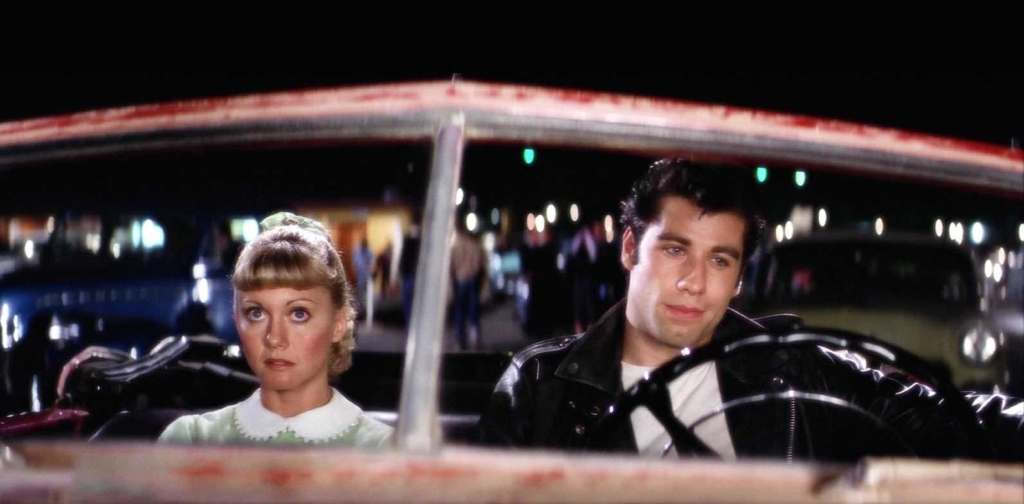

‘Stranded at the Drive-In / Branded a Fool / What Will They Say / Monday at School?’
*
So sobbed poor Danny Zuko, the horny high school himbo played by a be-quiffed and seriously over-age John Travolta in Grease, the smash-hit 1978 big-screen adaptation of Jim Jacobs and Warren Casey’s stage musical. Danny’s wailings came after Olivia Newton John’s goody-two-shoes Sandy walks out on him after wriggling free from his uninvited advances in the open-topped jalopy at the drive-in where they go on their date. “Sandy!”, Danny calls after she frees herself from his clutches in what she damningly calls his ‘sin wagon’ before storming off into the night. “You just can’t walk out of a drive-in …”
*
These are words that those behind plans for the forthcoming Sound & Vision Drive-In event might wish to pay some heed. A collaboration between Glasgow Film Festival and the Electric Frog electronic music festival, this large-scale in-car experience looks set to take place at the Riverside Museum in Glasgow this coming July. While the event’s full programme of music-based and classic films, live performances and DJs has yet to be announced, whatever phase of lockdown we’re in by then, as both its name and Danny Zuko suggest, walking out probably won’t be an option in the way we’re used to.
*
Sound & Vision Drive-In is nevertheless one of the first stirrings of pandemic-contained cultural life that doesn’t involve a laptop camera and social media livestreams. Arriving in the wake of successful drive-in events in Germany, it looks set to be part of a trend. In London, plans are underway for The Drive-In Club, which will host a series of contact-free, big-screen multi-genre events featuring a host of comedy stars in venues working under strict social distancing guidelines. As well as comedy shows, film nights, live music, DJs and live podcasts are planned.
*
Elsewhere in London, an already successful immersive staging of The Great Gatsby, F Scott Fitzgerald’s era-defining novel about party-going monied types, plans to reopen in October. This will be with a reduced capacity and inherent features which the show’s producers said in londontheatre.co.uk ‘make it safer than a trip to the supermarket’.
*
Despite the necessary restrictions, The Great Gatsby is attempting the sort of social interaction people are currently craving in an imaginative and genuinely creative way. As with Sound & Vision Drive-In and The Drive-In Club, however, whether it will be enough to satisfy audiences beyond novelty value remains to be seen.
*
Meanwhile, relaxation of social restrictions in England has seen horse racing meetings take place, golf courses are available to play a round in once again, while zoos and safari parks look set to open next week. Drive-in only branches of McDonald’s, Nando’s, KFC and other fast food emporiums are already open for business. Pub chain Wetherspoon also aim to be flogging cheap pints before summer’s out. Closer to home, tourism chiefs and tartan tat chain owners are quoted endlessly about getting the city open. Circuses, bread and burgers are all that’s on offer, it seems. Being stranded at the drive-in for real has never sounded so appealing.
*
A year before Grease, John Travolta made his name in Saturday Night Fever as Tony Manero, a working-class Italian-American Brooklynite who lives for the weekend. Through Tony, the John Badham directed film – produced, like Grease, by theatre impresario and rock band manager Robert Stigwood – highlighted the transformative pulling power of sweaty neon-lit dives, where busting some co-ordinated moves can liberate you enough to potentially change your life.
*
Saturday Night Fever was inspired by Tribal Rites of the New Saturday Night, a 1976 article by pop culture writer Nik Cohen, whose seemingly inside take on America’s blue-collar disco sub-culture appeared in New York magazine. Cohn later ‘fessed up to his piece being a work of fiction, with the Manero figure based on an old London mod mate he knew in the ‘60s.
*
The film nevertheless became iconic, defined both by its Bee Gees led soundtrack and its much-satirised poster image of a wide-collared and white-suited Travolta. Arm raised aloft, finger pointing heavenwards and hip thrust lasciviously to one side, Travolta looked cheesily and unreconstructedly heroic. Here was the promise of having a real good time together writ large.
*
Saturday Night Fever had a whole lot more going on than this image suggests, however. The film’s at times bleak study of dead-end kids at work, rest and play evokes a spirit of working-class aspiration and the sort of life-and-death club-land community that can only ever happen in the flesh rather than bumper to bumper.
*
Although drive-in movie shows never really took off in the UK, they’ve been around in America since 1915. Their appeal reached a peak between the late 1950s and the 1960s, enabled by increased car ownership and suburban living. Families could take their kids and not have to shell out for a baby-sitter, while for the new generation of teenagers, what were labelled by some as ‘passion pits’ were ideal for cheap dates and heavy petting. Despite this, the depiction of drive-ins in films like Grease has made them a somewhat revisionist symbol of a seemingly more innocent America.
*
As home entertainment improved, the appeal of drive-ins declined. Over the last few years, however, a revival of sorts has tapped into nostalgia-based retro-chic hipsterdom. In the current climate, the rise of Sound & Vision Drive-In and The Drive-In Club may yet become part of the much vaunted new normal.
*
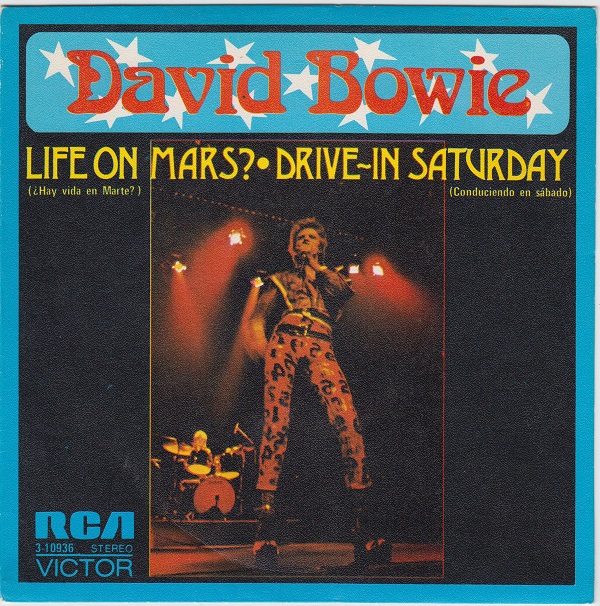

*
Given Sound & Vision Drive-In’s David Bowie inspired name, as well as checking out the wit and wisdom of Danny Zuko, Glasgow Film Festival and Electric Frog might also want to have a listen to Drive-In Saturday, Bowie’s doo-wop based 1973 single taken from his Aladdin Sane album. Set in a post-apocalyptic age, Drive-In Saturday tells the story of how, following what Bowie called a “catastrophe of some kind”, people have forgotten how to make love, and must resort to watching old porn films to see how it’s done.
*
That such a sexually charged piece of dystopian speculative-fiction set to an art-glam beat could reach number 3 in the 1973 UK singles chart was itself a major piece of pop subversion. 47 years on, listening to the song during lockdown, and with socially distanced in-car entertainment seemingly the only fun in town, what was originally an ennui-laden if oddly anthemic scarf-waver has become fused with a new resonance. Where it was once nostalgia for an age yet to come, Drive-In Saturday now sounds like prophecy of what happens when people are forced to self-isolate for so long that they forget how to get physical.
*
As online theatre and music shows run on apace, Netflix and Amazon Prime are likely to be earning more than all of them combined with work that was made specifically for the small screen. Meanwhile, an estimated 70 per cent of theatres and music venues are at risk of closing for good. Both the Royal Lyceum Theatre, Edinburgh and Pitlochry Festival Theatre have announced redundancies are likely at their respective institutions. A petition launched by Lyceum staff members opposing job losses has to date attracted more than 5,000 signatories, and is supported by actors Brian Cox and Alan Cumming, who both appeared on the Lyceum stage prior to making it big in Hollywood.
*
Another graduate of the Lyceum is David Tennant, who appeared there in 2005 in a production of John Osborne’s play, Look Back in Anger. Tennant is currently appearing alongside Michael Sheen in Staged, a new BBC series that makes for one of the most inventive uses of lockdown thus far. In Staged, Tennant, Sheen and their respective acting spouses, Georgia Moffett and Anna Lundberg, play a group of furloughed thesps attempting to rehearse a play on Zoom. The fact that the play they’re rehearsing is Pirandello’s absurdist Six Characters in Search of an Author, in which a group of fictional characters attempt to find themselves, knowingly adds to the grand meta-ness of what is one of the first real attempts to use lockdown as a dramatic form of itself.
*
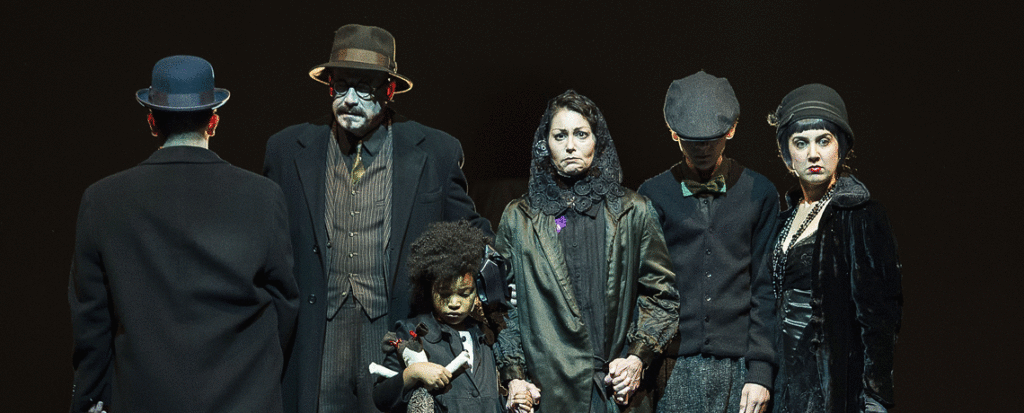

*
In an interview with Radio Times, Tennant called for government intervention to help save theatres across the UK. As with Sound & Vision Drive-In, Staged is an attempt, however temporary, to salvage something from the wreckage, and, by taking something bad, turn it into something good. Edinburgh International Book Festival’s just announced plans to host a programme of more than 100 free online events should be able to adapt the live chat show style format of much of what normally happens in a way that other artforms have made play with in their own image.
*
See the joys of Sophie Ellis-Bextor’s Kitchen Disco, in which for 20 minutes every Friday tea-time, post-modern pop star Ellis-Bextor sang her greatest hits to a lap-top backing track while her five kids ran riot. See too this week’s performance by The Flaming Lips on America’s late-night talk-fest, The Late Show. Playing their already euphoric 1999 hit, Race for the Prize, the band translated their extravagant stage show for the socially distanced age by having both performers and audience contained within individual plastic bubbles that gave the air of a gigantic play-pen.
*
One possible solution to try and ensure the live arts has some kind of future has come from director Sam Mendes, whose career began in theatre before moving into film. Mendes has called on Netflix and Amazon Prime to support the performing arts with the extra revenue they’ve generated during lockdown. In an article in the Financial Times, Mendes pointed out how live theatre fed into film and TV. It would be deeply ironic,” he said, “if the streaming services – Netflix, Amazon Prime et al – should be making lockdown millions from our finest acting, producing, writing and directing talent, while the very arts culture that nurtured that talent pool is allowed to die.”
*
Meanwhile, Lyceum artistic director David Greig’s play, Adventures with the Painted People, was commissioned by PFT, and was scheduled to open in Pitlochry in July as part of the Perthshire theatre’s Shades of Tay season. As it is, while Greig’s play won’t see light of day on stage until 2021, it premiered as part of BBC Radio 3’s Culture in Quarantine strand. It worked as well as any radio play, and sound-based work has been one of the most creative platforms throughout lockdown, but it’s a different experience to seeing it live.
*
As Greig said in an interview in the Guardian speaking alongside PFT artistic director Elizabeth Newman prior to the broadcast, “The nature of theatre is being in a room, breathing and sweating. Laughter generates laughter. Someone else crying gives you permission to cry.”
*
The Lyceum and PFT aren’t the only venues are at risk, and we’re not just talking high end stuff here. The sort of dives where Tony Manero and co strutted their stuff are likely to be the first casualties of a socially distanced future, and in the UK at least, are unlikely to be included in any kind of culture-mapped rescue exercise. Like the scenes played out in Drive-In Saturday, looking good on the dancefloor may well become a second-hand memory from long ago.
*
Keep Music Live is the name of a campaign launched in the 1960s by the Musicians Union. Back then, Keep Music Live was in opposition to what the union saw as a threat from recorded music, be it in dance-halls turned discos, or on the radio. In the ‘70s and ‘80s, the slogan was used as a counterblast to the sort of hi-tech sampling now taken for granted. ‘Synthesisers – Friend or Foe?’ asked a furrowed-browed headline on the front of the MU’s magazine at one point.
*
These days, Keep Music Live is more associated with campaigns to keep grassroots venues open in the face of noise complaints and encroaching gentrification. Road-worn Keep Music Live stickers can still be seen on flight cases carried by musicians of all stripe. Or they would be if we ever get to hear them play again. Again, as prophesised in Drive-In Saturday, and as The Flaming Lips have just shown, the notion of keeping anything live has taken on a whole new meaning.
*
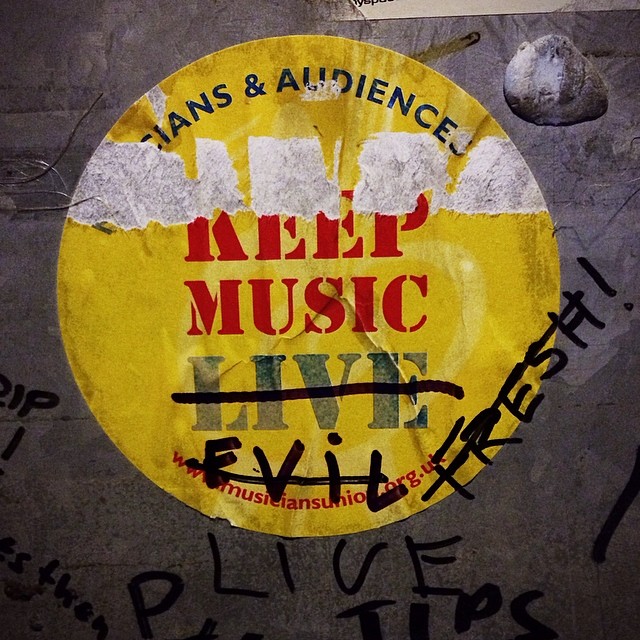

*
This was one of the things raised in a statement put out last week by Vanishing Point theatre company. While Glasgow-based, under the artistic vision of director Matthew Lenton, Vanishing Point have forged an international profile, with co-producers in Italy and other European countries.
*
The company’s production of The Metamorphosis, adapted from Franz Kafka’s novella about a young man who turns into a giant insect, and is locked up alone in his room, was one of the last theatre productions to make it to the stage before lockdown, albeit just for a few nights before the plug had to be pulled. At the time of the production’s enforced cancellation, the company described what they called ‘the strangest irony: a show that became about the moment we’re living in, cancelled because of the moment we’re living in.’
*
That was in March, which feels a lifetime ago now. Vanishing Point’s new statement, which can be read in full on the company’s website, is a call to arms for what it called ‘the importance and uniqueness of the live arts…’
*
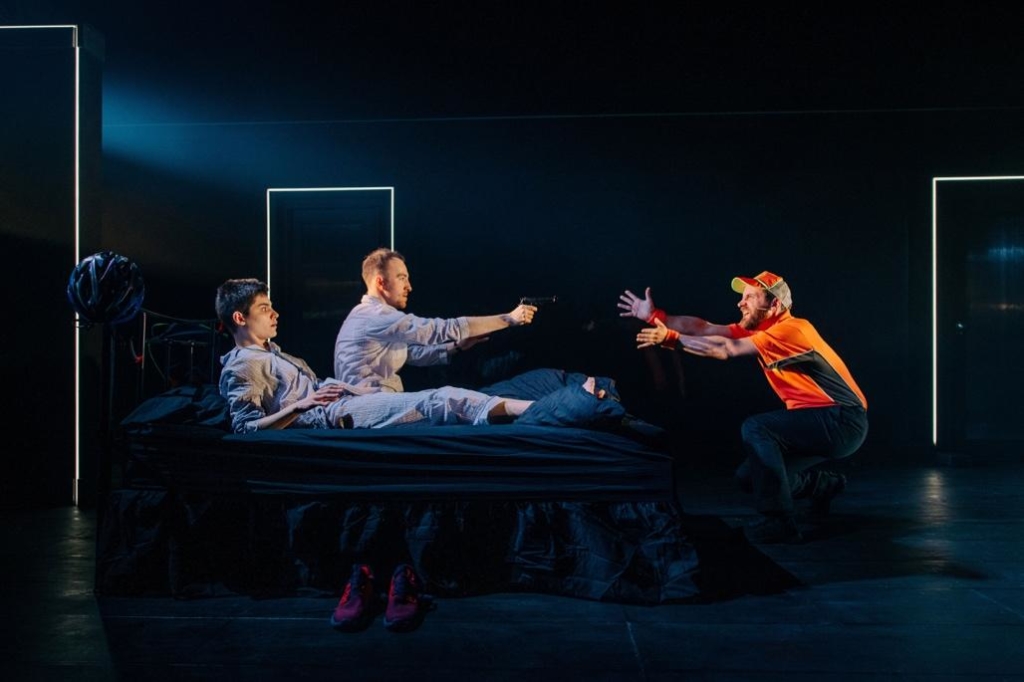

*
Rather than create online work, Vanishing Point announced that they were taking a step back and planning for a still unknown future when ‘we can make live shows again.’
*
Like Danny Zuko after Sandy walks out on him, Vanishing Point are keeping their distance. And if their decision makes you wonder why-yi-yi, one of the best evocations of the power of a live experience came from Kay Carroll, the first manager of The Fall, whose death aged 71 was announced last week.
*
It was Carroll’s professional and personal partnership with the late Mark E. Smith that gave the band much of its uncompromising attitude. Taken from an interview in Dave Simpson’s 2008 book, The Fallen, Barmcake magazine’s tribute tweet made clear how much Carroll understood how the incendiary and shamanic force of putting a few hundred people in a room went way beyond the mere notion of someone playing a few tunes.
*
“The Fall are interesting,” Carroll said, “because it’s not about the music. What was created was atmosphere and tension. You’d go to a gig and it was like the audience had all been in a plane crash and ended up in a field.”
*
In a world where Grease almost certainly isn’t the word, try experiencing THAT in the back of an open-topped convertible beside the Clyde.
